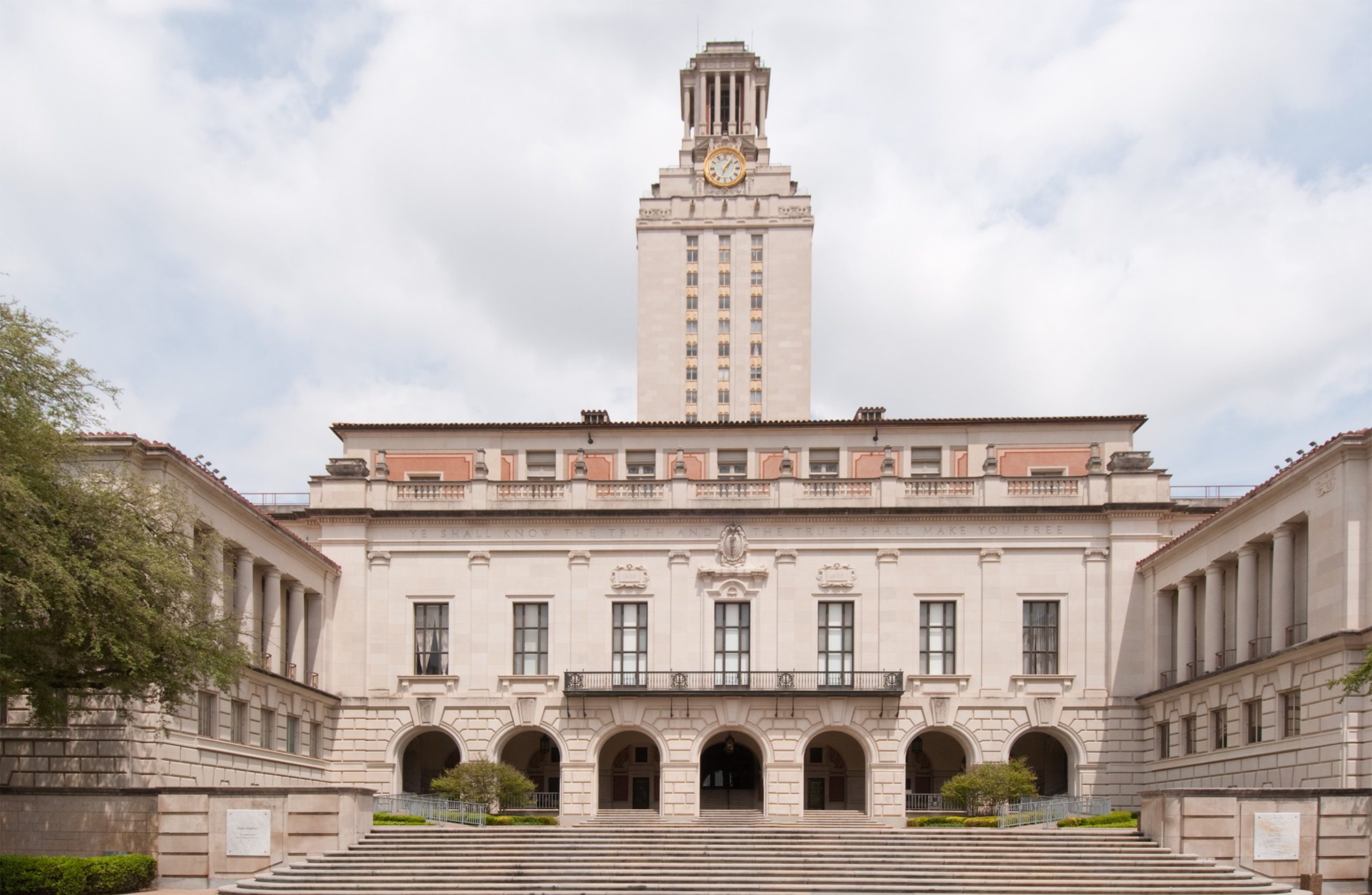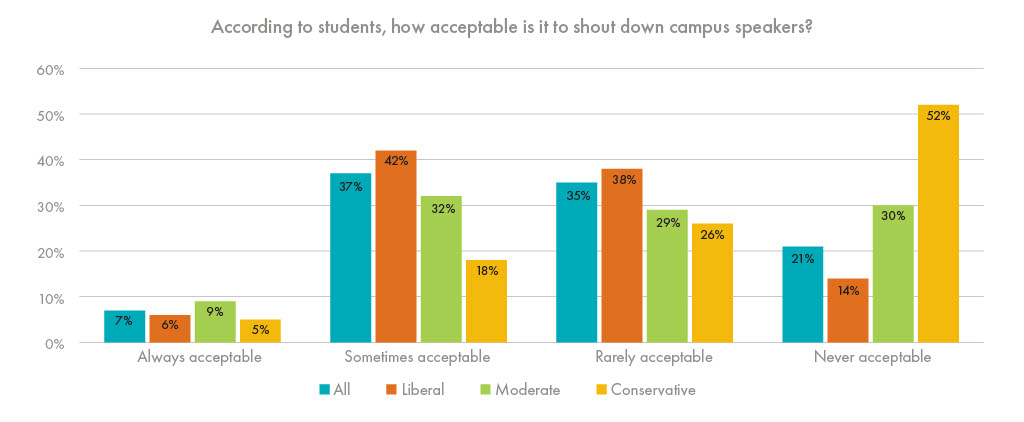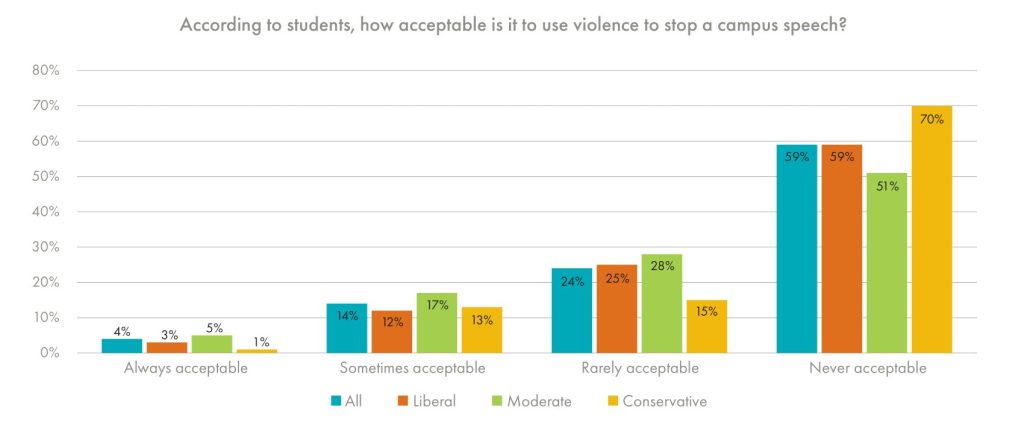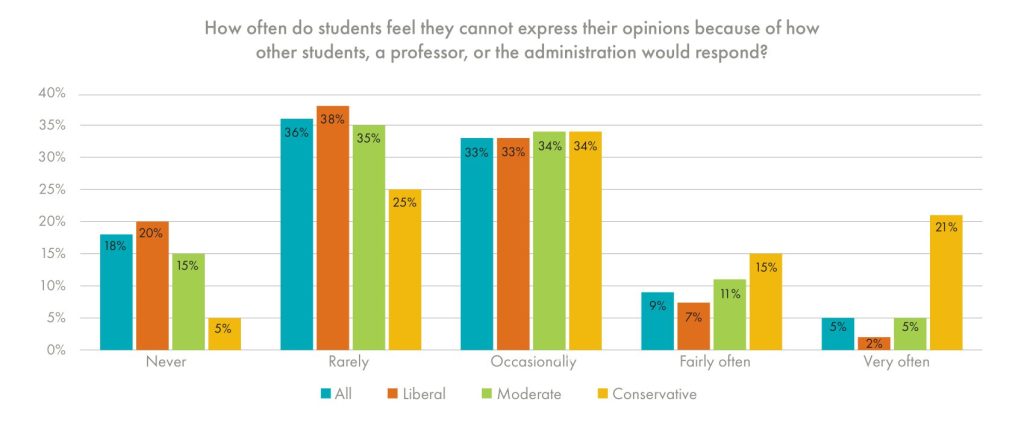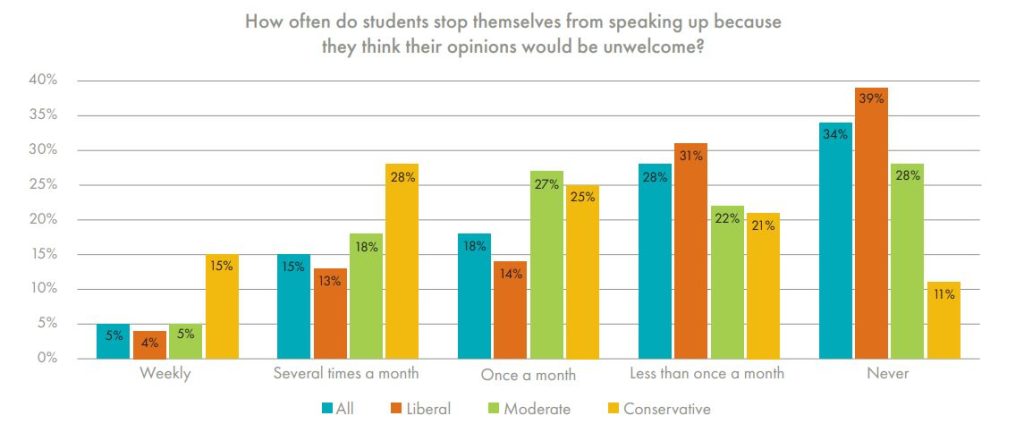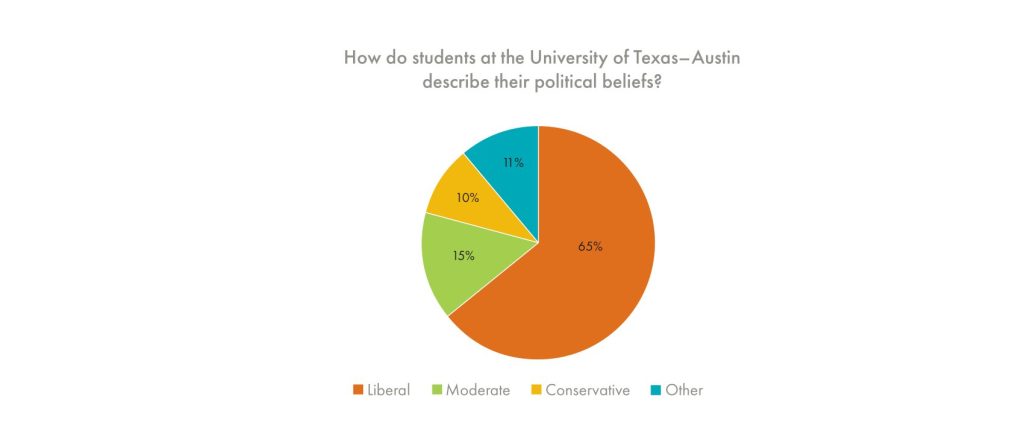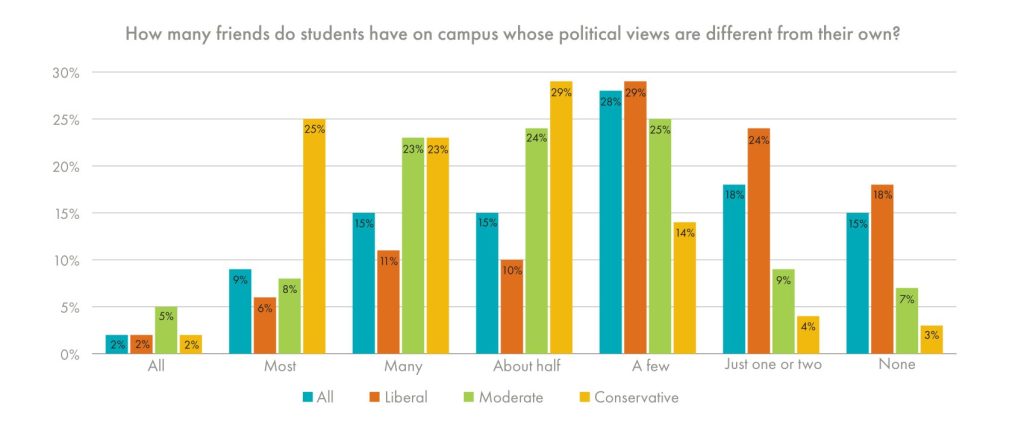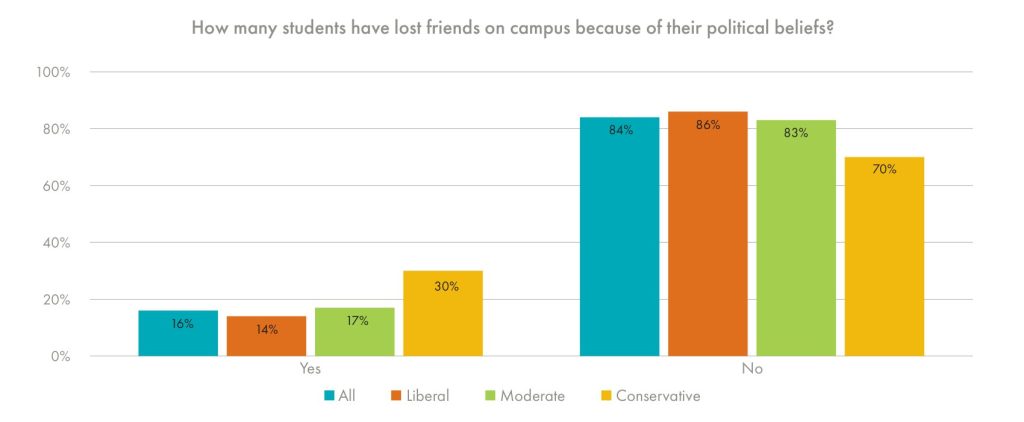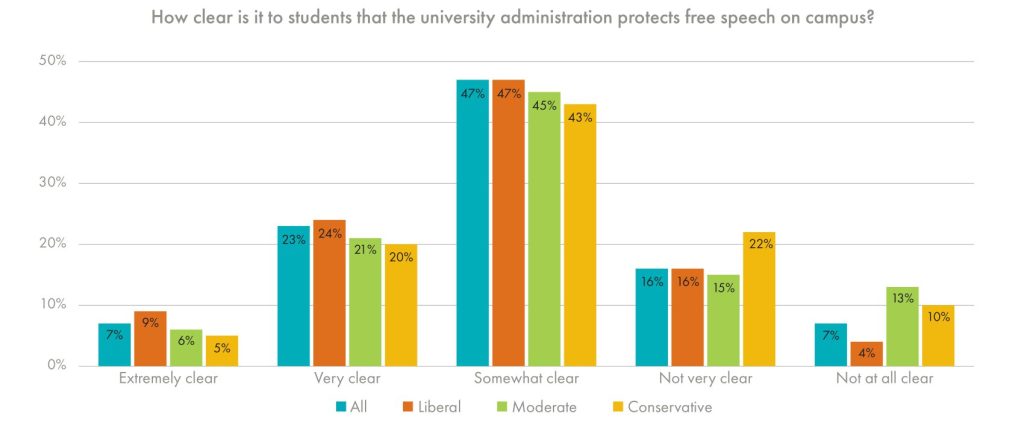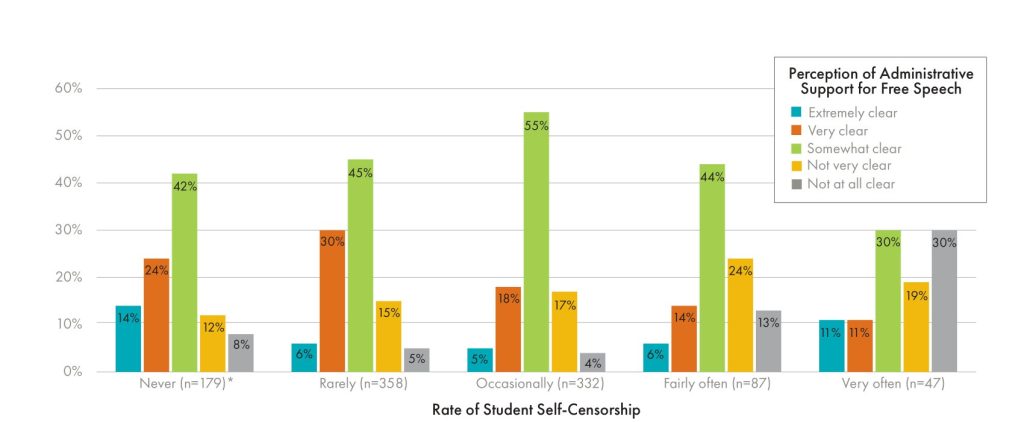Introduction
The University of Texas (UT)–Austin is a public Ivy that draws applicants from all corners of the United States and beyond. Its motto is, “Education is the guardian of the state.” But is UT–Austin fortifying our pluralistic democracy if its students self-censor and shout down views they do not like? Is it serving citizens, as its mission claims, if political and social views held by large percentages of the population are rarely heard on campus?
The UT System Board of Regents recently adopted the Chicago Principles on Freedom of Expression. This was an important action, signaling a commitment to free speech, but a recent survey of 1,003 UT–Austin students by the American Council of Trustees and Alumni (ACTA) and College Pulse shows that the university needs to do more to build a culture of free expression and viewpoint diversity on campus.
We asked students about their comfort level expressing unpopular ideas, their support for disrupting guest speakers, and their confidence in the university administration’s commitment to protecting free expression, among other topics. We found that undergraduate students are:
• too eager to shout down invited speakers or even use violence to silence them;
• prone to self-censorship; and
• uncertain that the university administration supports free expression on campus.
Our survey also reveals significant differences between the experiences of liberal and conservative students on campus, finding that:
• Conservative students are much more likely than liberals to censor themselves.
• Liberal students endorse censorship tactics at higher rates than conservatives.
• Liberal students are much more likely than conservatives to report having few or no friends who hold political views different from their own.
• Conservative students are much more likely to report having lost friends due to their political beliefs.
These results indicate that UT–Austin should do more to ensure that students routinely hear a wide variety of views and learn how to interact civilly with others.
Key Findings
• Only one-fifth of students (21%) say shouting down a campus speaker is never acceptable.
Every year, guest speakers are shouted down at colleges and universities across the country. These exercises of the “heckler’s veto” violate what U.S. Supreme Court Justice Thurgood Marshall termed the “freedom to speak and the freedom to hear.” Our survey shows that a troubling 44% of UT– Austin students believe that it is “sometimes acceptable” or “always acceptable” to use this tactic. We also found significant differences between liberal students, 48% of whom say shouting down a speaker is “sometimes acceptable” or “always acceptable,” and conservative students (23%). Conversely, only 14% of liberals say shouting down a speaker is “never acceptable,” whereas 52% of conservatives say the same.
• Only 6 in 10 students (59%) say it is never acceptable to use violence to disrupt a campus speaker.
A number of campus events featuring guest speakers turned violent this past year. Perhaps most notoriously, former NCAA swimmer Riley Gaines was accosted and trapped for hours after speaking at San Francisco State University. It is stunning that 18% of UT–Austin students say using violence to disrupt a guest speaker is “sometimes acceptable” or “always acceptable.” It is also notable that liberal students (15%) and conservative students (14%) essentially agree with one another on this point, although conservatives are more likely to say that violence is “never acceptable” (70% compared to 59% for liberals).
• Half of all students (47%) and 70% of conservative students report feeling like they could not express themselves at least occasionally.
Given the willingness to stop guest speakers from sharing their views, it is perhaps not surprising that half of respondents (47%) say they have at least occasionally felt like they could not express an opinion because of how students, a professor, or the university administration would respond. While only 14% say they felt this way “fairly often” or “very often,” the experience of liberal and conservative students again diverge, with 9% of liberal students saying they could not express themselves “fairly often” or “very often,” compared to 36% of conservatives. In addition, liberals are four times more likely to say they have never felt the need to self-censor (20% of liberals compared to 5% of conservatives).
• Four in 10 of all students (38%) and 7 in 10 conservative students (68%) report not speaking up at least once a month because they thought their opinion would be unwelcome.
Twenty percent of students say they have not spoken up at least several times a month because they thought their views would be unwelcome. This number is higher among conservatives: 43% compared to just 17% among liberals. Liberals are also four times more likely to say they have never not spoken up because they thought their view would be unwelcome (39% for liberals compared to 11% for conservatives). Taken together, the responses to this question and the previous one show that too many students are refraining from sharing their views, and that the campus community is particularly deprived of contributions from conservative students.
• Two-thirds of the UT–Austin student population (65%) identifies as liberal, and only 10% identifies as conservative.
It is especially concerning that conservative students are more likely to remain quiet when we consider how few of them there are on campus. Asked to place themselves on a nine-point ideological scale, most respondents (65%) said they were “very,” “somewhat,” or “slightly liberal.” Only 10% selected “very,” “somewhat,” or “slightly conservative.” In addition to “moderate,” respondents were given the opportunity to select “I do not identify as a liberal or a conservative” or “Haven’t thought much about this,” which we grouped as “other” in the chart below.
• Seven in 10 liberal students (71%) report having few to no friends with different political beliefs. Only 1 in 5 conservative students (21%) say the same.
Given the ideological composition of the student body at UT–Austin, it is not surprising that liberal students are not likely to have many friends with different political views. Eighteen percent of liberal students say they have no friends with different political views, compared to just 3% of conservatives. Conversely, 50% of conservatives say that many to all of their friends have different political views, whereas only 19% of liberals say the same.
• Conservatives (30%) are twice as likely as liberals (14%) to say that they have lost friends because of their political beliefs.
While conservative students are likely to have more friends with political views that are different from their own, they are also more likely to say they have lost friends due to their political beliefs. This is another indication that some students at UT–Austin struggle to get along with others who have different political views. Overall, 16% of UT–Austin students report having lost friends due to their political beliefs.
• Only one-third of students (30%) say it is “extremely clear” or “very clear” that the university administration protects free speech on campus.
When asked if it is clear that the university administration protects free speech, most students answered “somewhat clear.” There is only a slight gap between conservatives (25%) and liberals (33%) who say it is “extremely clear” or “very clear.”
• Students who self-censor more often are more likely to find the university administration’s stance on free expression “not very clear” or “not at all clear.”
Not surprisingly, those who report that they self-censor very often are more likely to be unsure about the administration’s willingness to protect free speech on campus. Forty-nine percent of these students say the administration’s position is “not very clear” or “not at all clear.”
Conclusion
Our data suggest that UT–Austin must do more to promote free expression and viewpoint diversity on campus. The university should also be concerned about students’ willingness to shout down speakers or even use violence to disrupt them. ACTA lauds the UT System Board of Regents for adopting the Chicago Principles on Freedom of Expression and encourages the UT–Austin administration to take decisive actions to build on this foundation. If UT–Austin implements free expression programming during freshman orientation, adopts a statement of institutional neutrality, and creates more opportunities (such as campus debates) for students to hear a variety of views, it will be poised to strengthen a culture of freedom and tolerance for all members of the campus community.
Appendix A: Methodology
This survey was designed and conducted by College Pulse. Interviews were conducted in English among a sample of 1,003 undergraduate students who were enrolled at the University of Texas–Austin during the 2022—23 academic year. Survey panel members were recruited by a number of methods to help ensure diversity in the panel population, including web advertising, permission-based email campaigns, and partnerships with university organizations.
To reduce the effects of any non-response bias, a post-stratification adjustment was applied based on demographic distributions from the 2017 Current Population Survey (CPS). The post-stratification weight rebalanced the sample based on the following benchmarks: age, race and ethnicity, and gender. The sample weighting was accomplished using an iterative proportional fitting (IFP) process that simultaneously balances the distributions of all variables. Weights were trimmed to prevent individual interviews from having too much influence on the final results.
The margin of error for this survey is ±3%. Margins of error are typically calculated on probability-based samples and are not technically correct for non-probability online samples. We supply them here to provide a general assessment of error ranges that may be associated with the data.
Appendix B: Survey Questions in this Report
Q1: How acceptable would you say it is for students to engage in the following action to protest a campus speaker: Shouting down a speaker or trying to prevent them from speaking on campus.
1) Always acceptable
2) Sometimes acceptable
3) Rarely acceptable
4) Never acceptable
Q2: How acceptable would you say it is for students to engage in the following action to protest a campus speaker: Using violence to stop a campus speech?
1) Always acceptable
2) Sometimes acceptable
3) Rarely acceptable
4) Never acceptable
Q3: On your campus, how often have you felt that you could not express your opinion on a subject because of how students, a professor, or the administration would respond?
1) Never
2) Rarely
3) Occasionally
4) Fairly often
5) Very often
Q4: How often have you not spoken up on campus because you thought your opinion would be unwelcome?
1) Weekly
2) Several times a month
3) Once a month
4) Less than once a month
5) Never
Q5: Using the following scale, how would you describe your political beliefs?
1) Very liberal, somewhat liberal, or slightly liberal
2) Moderate/middle of the road
3) Slightly conservative, somewhat conservative, or very conservative
4) I do not identify as a liberal or a conservative, or haven’t thought much about this
Q6: How many friends on campus do you have who adhere to a different political ideology?
1) All
2) Most
3) Many
4) About half
5) A few
6) Just one or two
7) None
Q7: Have you lost friends on campus because of your political beliefs?
1) Yes
2) No
Q8: How clear is it to you that your college administration protects free speech on campus?
1) Extremely clear
2) Very clear
3) Somewhat clear
4) Not very clear
5) Not at all clear
